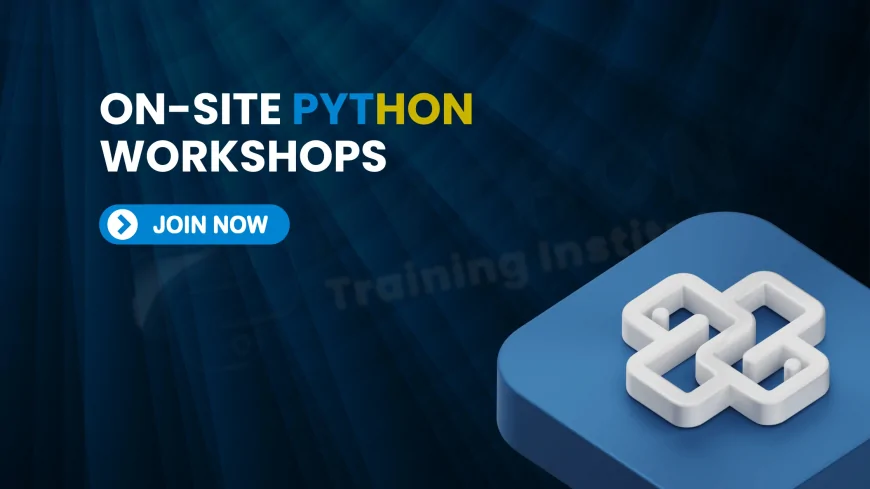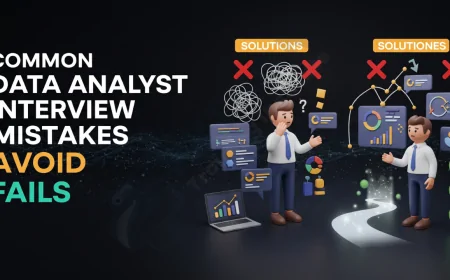On-Site Python Workshops Pune | Pune On-Site Python Skill Development Workshops
Discover top On-Site Python Workshops in Pune offering customized, hands-on Python training for corporates, startups, students, and professionals. Learn Python programming with expert trainers, real-world projects, and flexible schedules right at your location.

Introduction to On-Site Python Workshops
Python is one of the most versatile and in-demand programming languages today. Pune, known as an IT and educational hub, offers excellent on-site Python workshops tailored to organizations, educational institutions, and groups seeking personalized, hands-on training at their own location. These workshops aim to provide practical knowledge with real-time coding, project development, and problem-solving skills that prepare participants for real-world Python applications.
Benefits of On-Site Python Workshops
On-site Python workshops offer several advantages:
- Convenience: Training happens at your office, institution, or any preferred location, saving travel time and related costs.
- Customized Training: Tailored content based on the team's skill levels, project needs, and business goals.
- Team Building: Cohesive group learning fosters collaboration and improves team dynamics.
- Hands-On Experience: Real-time coding exercises and live projects enhance learning retention.
- Expert Trainers: Experienced instructors with industry exposure provide practical insights.
- Flexible Scheduling: Workshops can be scheduled according to the availability of participants.
Who Can Attend These Workshops?
On-site Python workshops in Pune cater to a wide audience:
- Corporate Teams: IT professionals, developers, data analysts, and DevOps teams.
- Educational Institutions: Students, faculty members, and research scholars.
- Startups: Founders and team members needing Python skills for product development.
- Freelancers & Hobbyists: Individuals wanting a focused learning environment.
- Non-Technical Professionals: Those interested in Python for automation and data handling.
Customized Curriculum for Different Needs
On-site workshops allow flexible curriculum design based on the participants’ background and objectives. Common customization options include:
- Beginner-friendly sessions focusing on Python basics and syntax.
- Advanced workshops covering web frameworks like Django and Flask.
- Data science and machine learning-oriented Python training.
- Python for automation, scripting, and DevOps tasks.
- Integration of Python with cloud computing and APIs.
Popular Topics Covered in On-Site Python Workshops
These workshops cover a broad range of topics to ensure comprehensive learning:
- Python fundamentals: data types, control structures, functions, and modules.
- Object-Oriented Programming (OOP) concepts.
- Working with libraries such as NumPy, Pandas, and Matplotlib.
- Web development basics with Flask and Django.
- Data handling and visualization.
- API development and integration.
- Automation scripting for business processes.
- Testing and debugging Python applications.
- Deployment strategies including Docker and cloud services.
Training Formats and Methodologies
On-site workshops typically include:
- Interactive Lectures: Conceptual understanding through engaging talks.
- Hands-On Coding: Live coding sessions and exercises to reinforce learning.
- Group Projects: Collaborative tasks mimicking real workplace scenarios.
- Q&A and Doubt Clearing: Dedicated time for addressing participant queries.
- Assessments: Regular quizzes and practical tests to track progress.
Tools and Technologies Used
On-site workshops equip learners with industry-standard tools including:
- Python IDEs: PyCharm, VS Code, Jupyter Notebooks.
- Version control: Git and GitHub.
- Package managers: pip and conda.
- Virtual environments for dependency management.
- Database connectivity using SQLite, MySQL, or PostgreSQL.
- Containerization tools like Docker.
- Cloud platforms (optional) such as AWS and Azure.
Corporate Training and Team Workshops
Many companies in Pune leverage on-site Python workshops for skill upgrades, digital transformation, and project acceleration. Customized corporate training includes:
- Understanding business-specific requirements and challenges.
- Focus on Python applications relevant to the company’s domain.
- Hands-on sessions with real company projects or datasets.
- Follow-up support and refresher sessions.
Case Studies and Success Stories
Several Pune-based organizations have successfully implemented on-site Python workshops to boost productivity. For instance:
- A fintech startup trained its product team on Python automation, reducing manual errors by 30%.
- An IT service provider enhanced their analytics team’s skills, resulting in faster client delivery.
- An educational institution introduced Python workshops for faculty, integrating coding in their curriculum.
How to Choose the Best On-Site Python Workshop in Pune
When selecting a provider, consider:
- Trainer expertise and industry experience.
- Customization and flexibility of the curriculum.
- Hands-on project exposure and practical learning.
- Reviews, testimonials, and success stories.
- Post-training support and placement assistance.
- Cost-effectiveness and training duration.
Cost and Duration of Workshops
The cost of on-site Python workshops varies based on:
- Number of participants.
- Course depth and duration.
- Customization level.
- Additional services like placement support.
Typically, workshops last from 3 days to 4 weeks, with flexible scheduling options.
Placement Assistance and Career Growth
Several training providers in Pune offer placement support, including interview preparation, resume building, and job referrals, helping participants transition into Python development roles.
Online vs On-Site Python Workshops
While online workshops offer convenience and accessibility, on-site workshops provide personalized attention, group dynamics, and practical hands-on learning in a collaborative environment, often preferred by corporates and teams.
Latest Trends in Python and Corporate Training
Emerging trends impacting Python training include:
- Integration with AI and machine learning frameworks.
- Adoption of cloud computing and DevOps tools.
- Serverless computing and microservices architectures.
- Focus on data security and privacy compliance.
- Increased use of interactive notebooks and real-time collaboration tools.
Frequently Asked Questions (FAQs)
1. What is an on-site Python workshop?
An on-site Python workshop is a training program conducted at your location, tailored for your team or group, focusing on hands-on Python programming and real-world applications.
2. How is on-site training different from online courses?
On-site training offers face-to-face interaction, immediate feedback, team collaboration, and customization based on the group’s needs, unlike generic online courses.
3. What are the advantages of on-site workshops for companies?
They reduce employee downtime, improve teamwork, tailor learning to business needs, and provide practical, applicable skills quickly.
4. Can beginners attend on-site Python workshops?
Yes, many workshops start with fundamentals and gradually progress to advanced topics, suitable for beginners.
5. How long does a typical workshop last?
Duration ranges from a few days to several weeks depending on course content and participant availability.
6. Are real projects included in the training?
Yes, workshops emphasize hands-on projects to simulate real work scenarios.
7. Do I need to provide any infrastructure for on-site training?
Usually, participants need computers with required software installed. Trainers may bring additional resources or suggest cloud-based tools.
8. Can workshops be customized to industry-specific needs?
Absolutely, most providers customize curriculum and examples to match your industry and team goals.
9. Is there any certification after completion?
Yes, many institutes provide certificates which add value to your professional profile.
10. How many participants can attend an on-site workshop?
Groups typically range from 5 to 30, but larger groups can be accommodated with multiple trainers.
11. What kind of post-training support is available?
Some providers offer doubt-clearing sessions, access to learning materials, and career counseling after training.
12. Are these workshops suitable for remote teams?
On-site workshops are ideal for co-located teams, but hybrid or online options are also available for remote teams.
13. How do on-site workshops improve employee productivity?
By providing focused, practical skill development that employees can immediately apply to their work.
14. What languages or frameworks are covered?
Python core, plus frameworks like Django, Flask, data libraries (Pandas, NumPy), and tools like Docker and Git.
15. Are the trainers industry experts?
Reputed providers employ trainers with real industry experience and strong academic backgrounds.
16. Can these workshops help in project acceleration?
Yes, by upskilling teams, reducing errors, and improving code quality and deployment speed.
17. What is the cost range for on-site workshops?
Costs vary based on duration, group size, and customization but generally offer better ROI compared to sending employees for external training.
18. Are any free demos or trial sessions available?
Some providers offer demos to showcase their teaching style and course content.
19. How soon can workshops be scheduled?
Scheduling depends on trainer availability and client readiness but can often be arranged within a few weeks.
20. Can workshops include training on the latest Python updates?
Yes, curricula are regularly updated to include new Python features and industry best practices.
Conclusion
On-site Python workshops in Pune provide a powerful, practical way to boost Python programming skills for individuals and teams. With customized training, hands-on projects, and expert guidance delivered right at your doorstep, these workshops bridge the gap between theory and real-world application. Whether you are a corporate team aiming to enhance productivity or an educational institute wanting to embed coding in the curriculum, on-site Python training offers an ideal, flexible learning solution. Leveraging Pune's strong IT ecosystem and expert trainers, participants can gain career-ready skills, certifications, and industry insights, making these workshops a valuable investment in professional growth.
What's Your Reaction?
 Like
0
Like
0
 Dislike
0
Dislike
0
 Love
0
Love
0
 Funny
0
Funny
0
 Angry
0
Angry
0
 Sad
0
Sad
0
 Wow
0
Wow
0
















